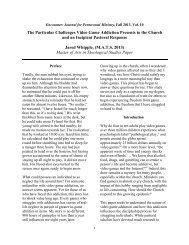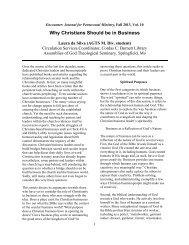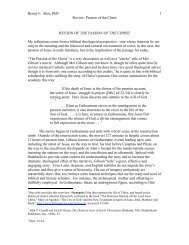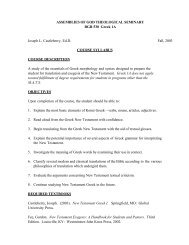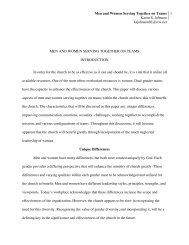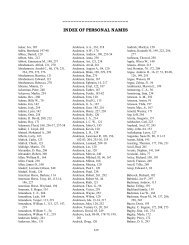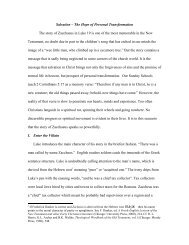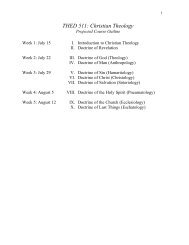Encounter: Journal for Pentecostal Ministry - Assemblies of God ...
Encounter: Journal for Pentecostal Ministry - Assemblies of God ...
Encounter: Journal for Pentecostal Ministry - Assemblies of God ...
Create successful ePaper yourself
Turn your PDF publications into a flip-book with our unique Google optimized e-Paper software.
athlete, computer expert, artist, etc. For each<br />
<strong>of</strong> these roles, she feels a list <strong>of</strong><br />
accompanying obligations. After work<br />
hours, “leisure time” becomes a time to<br />
fulfill this list <strong>of</strong> self-imposed obligations.<br />
So instead <strong>of</strong> relaxing and enjoying time <strong>of</strong>f,<br />
she approaches it as yet another to-do list,<br />
one which is never finished. 19 Unlimited<br />
freedom results in unlimited responsibility<br />
to define one’s own identity. “We have<br />
become walking résumés. If you’re not<br />
doing something, you’re not creating and<br />
defining who you are.” 20 To be less than<br />
busy is to admit one’s limits to the world.<br />
The result is a generation <strong>of</strong> Americans too<br />
busy to live the Christian life. The American<br />
economic structure encourages the endless<br />
cycle <strong>of</strong> working harder to earn more money<br />
to spend more money. Americans are busy<br />
because the culture values busyness as a<br />
status symbol. In contrast, free time is<br />
looked down upon as a waste <strong>of</strong> time, a<br />
waste <strong>of</strong> life. Any “rest” time is seen in a<br />
utilitarian sense as a way to work more<br />
productively later. Americans are busy<br />
because the culture advertises unlimited<br />
freedom <strong>of</strong> identity and choice; there<strong>for</strong>e,<br />
Americans feel an anxiety and a need to<br />
define who they are by what they are able to<br />
accomplish.<br />
Sabbath: A Counter-Cultural Gift from<br />
<strong>God</strong><br />
The Bible, however, does not value<br />
busyness and productivity the way<br />
Americans do. Instead, it values peace and<br />
relationships—both with <strong>God</strong> and others—<br />
that <strong>of</strong>ten require significant amounts <strong>of</strong><br />
time and a pace that would feel abysmally<br />
slow to most Americans. The Bible also<br />
values rest, not in utilitarian terms, but as<br />
good and meaningful in and <strong>of</strong> itself. The<br />
concept <strong>of</strong> Sabbath wraps up the biblical<br />
value <strong>of</strong> slowness and rest.<br />
4<br />
Sabbath in the Old Testament<br />
From the very beginning, <strong>God</strong> himself<br />
carefully and emphatically laid down a<br />
pattern <strong>of</strong> intentional rest. Many helping<br />
pr<strong>of</strong>essionals, such as counselors, doctors,<br />
and ministers, feel a constant responsibility<br />
to help others, but the Bible speaks <strong>of</strong> a<br />
Creator <strong>God</strong> who rests—despite the fact that<br />
the existence <strong>of</strong> the entire universe is<br />
sustained by Him. <strong>God</strong> does not rest because<br />
He’s grown tired or in order to work more<br />
efficiently later but because there is inherent<br />
meaning and value in rest. Jürgen Moltmann<br />
writes,<br />
<strong>God</strong> does not “rest” in the<br />
sense <strong>of</strong> taking a break now<br />
and then, in order to gather<br />
strength <strong>for</strong> further tasks. …<br />
This rest, this joy, this simple<br />
being-there on the Sabbath is<br />
the meaning <strong>of</strong> <strong>God</strong>’s entire<br />
work … For the sake <strong>of</strong> this<br />
celebration everything which<br />
exists was created. 21<br />
<strong>God</strong>’s rest becomes the pattern <strong>of</strong> the<br />
Sabbath <strong>for</strong> the Jewish people. Of all the<br />
commandments in the Decalogue, the<br />
command to keep the Sabbath is the longest,<br />
comprising almost a third <strong>of</strong> the passage:<br />
Remember the Sabbath day,<br />
to keep it holy. Six days you<br />
shall labor, and do all your<br />
work, but the seventh day is a<br />
Sabbath to the Lord your<br />
<strong>God</strong>. On it you shall not do<br />
any work, you, or your son,<br />
or your daughter, your male<br />
servant, or your female<br />
servant, or your livestock, or<br />
the sojourner who is within<br />
your gates. For in six days<br />
the Lord made heaven and




